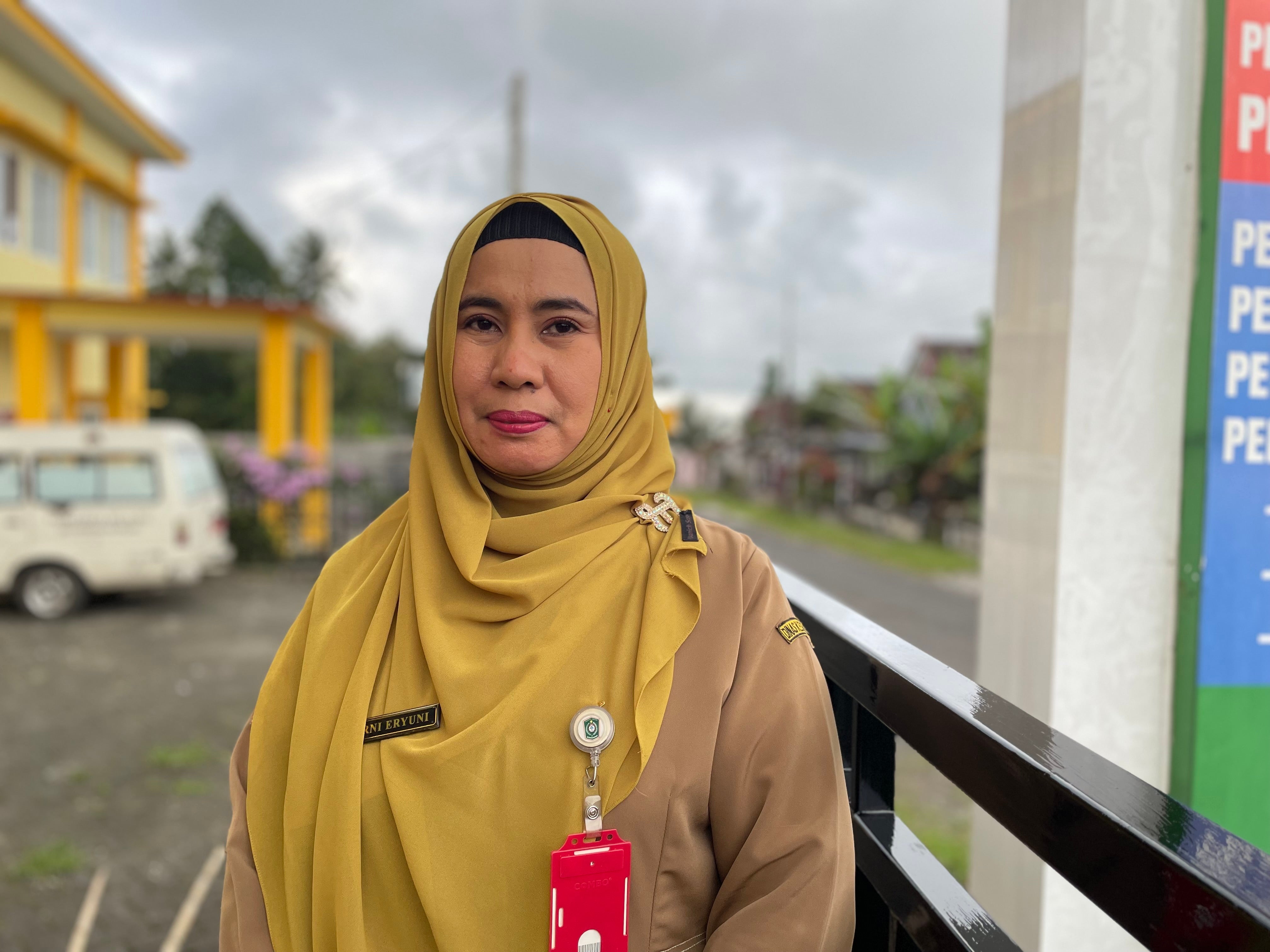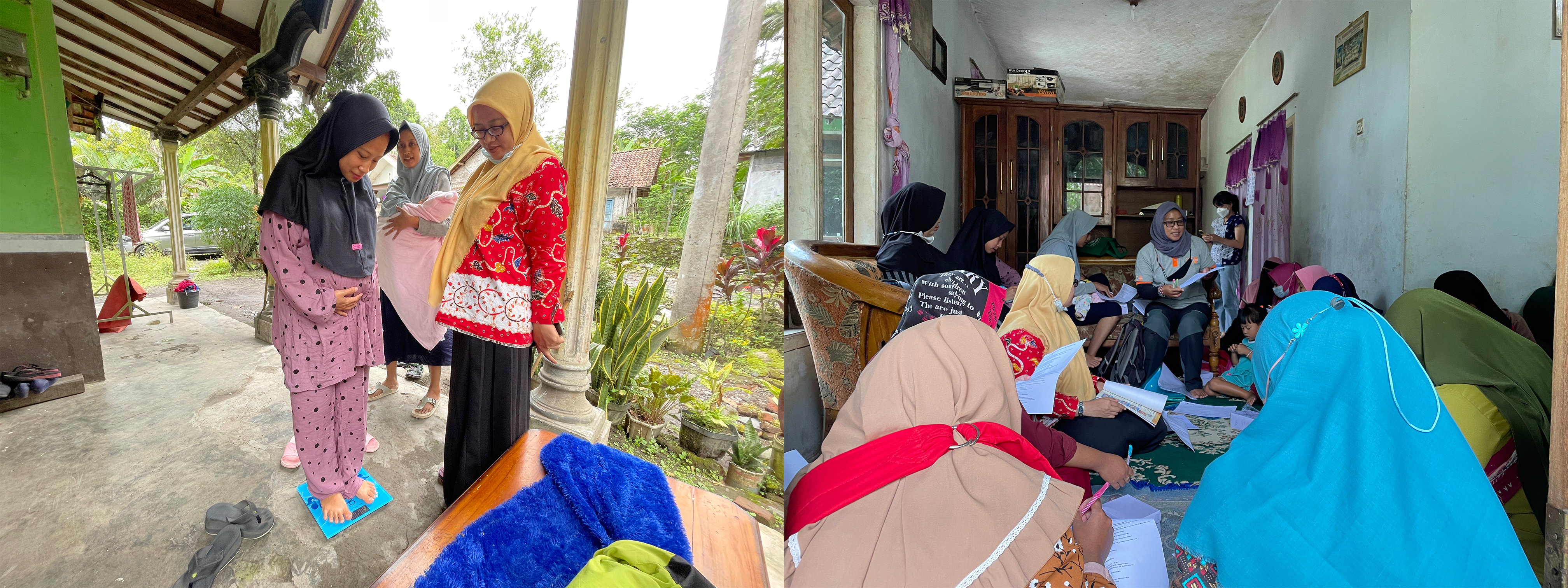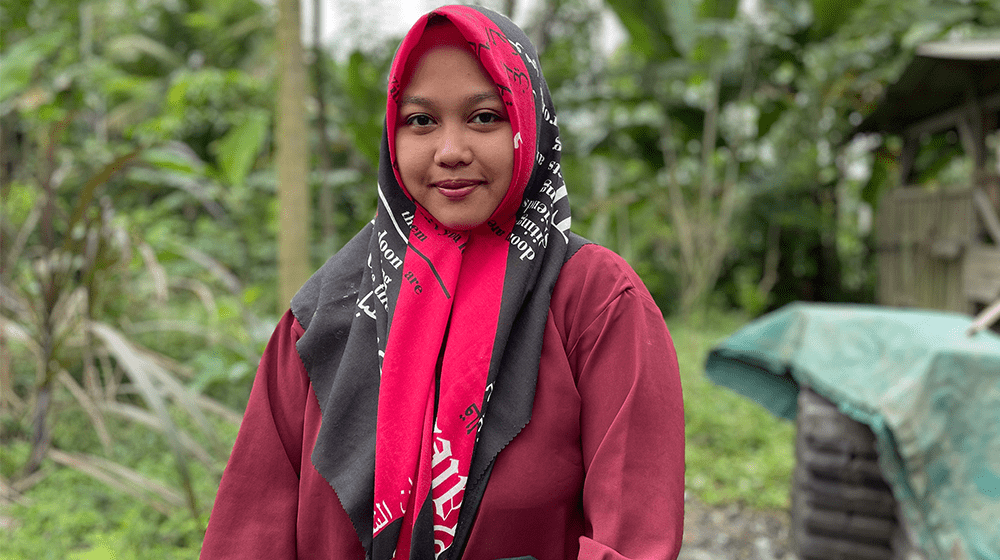When the Semeru volcanic eruption on 4 December 2021 struck Sumber Wuluh village where she lives, Safa Atin Ridho (26) had to flee with her husband to her in-law’s house in Jember, around 89 km east of Sumber Wuluh, Lumajang Regency, East Java. She was three months pregnant. “We stayed in Jember for two weeks, and then moved to my aunt’s house in Lumajang City for a week. I returned home after three weeks,” Safa reminisced. “Although the situation was stable at that time, I was scared because Sumber Wuluh was still a red zone.”
Women and girls are especially vulnerable in emergency situations. In addition to physical and mental health hazards, pregnant women and those in the postpartum period often face barriers to the maternal and reproductive health services they need to ensure healthy pregnancy and safe delivery. When disaster strikes amid the COVID-19 pandemic, women face multiple layers of risks and burdens.
The United Nations Population Fund (UNFPA) works with Yayasan Kerti Praja, Rifka Annisa, and Provincial and District Health Offices to provide cash voucher assistance to 300 pregnant women urgently needing life-saving reproductive health assistance in three post-disaster areas, Sleman (Yogyakarta), Lumajang (East Java), and Pasaman and West Pasaman Barat (West Sumatra). The cash assistance is part of the “Pulih Bersama: COVID-19 Surge Response and the UNFPA Emergency Fund” (C-Surge Pulih Bersama) programme supported by Australia’s Department of Foreign Affairs and Trade (DFAT).
With the cash transfers, pregnant women are enabled to access life-saving health interventions to prevent maternal deaths. After each appointment they attend, they will receive cash through bank transfers. Each woman would receive IDR 700,000 (around USD 46) maximum to cover transportation to access antenatal care (ANC), delivery services, and post-natal care (PNC) services, purchase hygiene items and complementary nutritious food for mothers or newborn babies, or cover any other ancillary costs related to accessing health services. Nutritional packages and maternal health classes are also part of the intervention.
The impact of disasters on maternal health
Luckily for Safa, a distant relative of her husband in Jember is a midwife. So, in displacement, she could still consult a health worker on her pregnancy. “I was worried at that time because I had to run during the eruption. I didn’t even remember that I was still early in my pregnancy (when I was running). So I had to make sure that it was okay,” she said. A midwife also visited her at her aunt’s house in Lumajang City.
The disaster still affected her and her pregnancy, nevertheless. Her water broke early, so she had to undergo a C-section to give birth. “The midwife took me to the community health center (puskesmas)... When the water nearly ran out but the baby still hadn’t come out, I was referred to a hospital,” Safa recalled. “Thank God it went well.”
Safa thought that the stress caused by the volcanic eruption contributed to the complications she experienced during labor. “Until now I still get scared when the sky is dark or when it rains… At the hospital, the doctor and midwife warned me to not get too stressed out,”’ she said.
Her three-month old baby also feels the impact. “I still can’t breastfeed my baby. I have tried so many ways but nothing worked because of the stress. So I have to feed the baby with formula milk,” Safa explained.
Safa has used the cash assistance to buy milk for her baby. “As soon as I got the cash, I bought milk. I used all the money to buy milk,” she said. “The cash assistance really helped.”
After her husband lost her job at a local lumber mill after the Semeru volcanic eruption, Safa and her family have relied on selling iced drinks at home to make a living.
“The cash voucher assistance came at the right time, when all humanitarian assistance has ceased,” said Erni Eryuni, the coordinator midwife of the Penanggal community health center (puskesmas), around 4 km from Sumber Wuluh. “It has really helped because we actually need comprehensive assistance in this post-disaster period,” she continued.

There has been zero maternal death in Candipuro, Lumajang, East Java, since the Semeru volcanic eruption in December 2021, according to Midwife Erni Eryuni.
(Photo: Rahmi Dian Agustino/UNFPA Indonesia)
Reproductive health educations saves lives

At maternal health classes, pregnant and postpartum women learn how to make sure they and their babies are healthy.
(Photos: Rahmi Dian Agustino/UNFPA Indonesia)
As part of the comprehensive response, the “C-SURGE Pulih Bersama” programme has also provided maternal health classes for the cash voucher assistance recipients. From these classes, Safa has gained critical knowledge about sexual and reproductive health that she needs as a new mother.
She learned a lot about family planning. “I didn’t know much about family planning. From the classes I have attended, I learned that there are many methods of family planning… and I don’t have to be afraid of the side effects,” Safa explained. With all the information she has received, now Safa knows which contraceptive method is best for her. “I think IUD would be best for me because it’s simple and can last for years.”
“People say that the first breast milk should be discarded. But from the classes, I learned that the first breast milk is actually really good,” she said.
Additionally, through the classes Safa gained a new support system. “I never participated in gatherings with other pregnant women in the village before… Now I can increase my knowledge and share with my peers,” she said. Safa said that she would still go to such classes after the programme is completed. “These classes are important for pregnant women, especially since it was my first pregnancy,” she said.
“I am really thankful for the assistance because it has really benefited me and my family… I hope this programme will continue so that more people can benefit from it,” Safa concluded.
Midwife Erni echoed Safa’s hopes. “The cash voucher assistance has really helped women and health workers here,” she said. “I hope the programme is extended into a comprehensive programme that does not just help pregnant women in post-disaster but also other reproductive health sub-cluster targets.”
Rahmi Dian Agustino
Communications Analyst, UNFPA Indonesia



